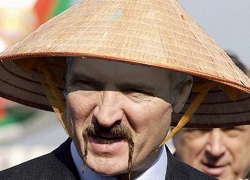 Belarus becomes Beijing's main bridgehead in Europe. The influential magazine Business New Europe writes about it. "Russia spent the end of last year battling the EU for control over Ukraine. But should the Kremlin have been paying more attention to what was going on its southern border instead? In the last three months, the Chinese have swept through Central and Eastern Europe (CEE) and Central Asia, buying up Russia's backyard in a string of billion-dollar deals," the magazine writes.
Belarus becomes Beijing's main bridgehead in Europe. The influential magazine Business New Europe writes about it. "Russia spent the end of last year battling the EU for control over Ukraine. But should the Kremlin have been paying more attention to what was going on its southern border instead? In the last three months, the Chinese have swept through Central and Eastern Europe (CEE) and Central Asia, buying up Russia's backyard in a string of billion-dollar deals," the magazine writes.
Chinese President Xi Jinping was was to meet with Vladimir Putin in September last year to conclude a crucial natural gas deal that would see a gas pipeline built to connect Russia's Siberian fields with China's northwest territories. But instead of flying directly to Russia, President Xi went on a whirlwind tour of Central Asia. "It was like a visit from Santa Claus as Xi distributed billions of dollars of deals along the way," bne notes.
Chinese PM Li Keqiang visited Central and Eastern Europe week later. "Prime ministers from 16 Emerging European countries respectfully lined up with their caps in hand and the gold rained down," the magazine describes the visit.
"China is clearly on an aggressive westward expansion and trying to spend their accumulated treasure of dollars before anything untoward happens to the currency," bne writes. "The reason why Russia didn't complain about the Turkmen gas deal or any of the other deals in Central Asia is because Russia is one of the biggest recipients of this bonanza: Chinese investment into Russia surged 685% over the same period. The issue of the day is not whether Ukraine will become a vassal of Russia's new Soviet Union Inc, but if Russia will become just one of China's many raw materials appendages."
The promises that Xi and Li made are now starting to bear fruit this year. "The deals come in two flavours: raw materials (and especially hydrocarbons) and infrastructure. In general, most of the deals cut in Central and Southeast Europe are infrastructure deals, whereas those in Eastern Europe and Central Asia are energy and mineral deals," the magazine notes.
China signed a $60bn energy investment deal that includes $10bn to develop the massive Galkynysh gasfield in Turkmenistan which has gas reserves of some 1.3 trillion cubic metres – enough to meet China's needs for several years. In Mongolia, China develops the Tamsag basin oil deposit. Ulaanbaatar agreed in January to build its first oil export line to China. "Gas pipelines are the geopolitical equivalent of marriage, as they cost a lot to build and can't be moved once completed," the magazine writes.
Central Asia's hydrocarbon king has tied Mongolia's economy closely to its neighbour China, but President Nursultan Nazarbayev has shown himself a master of international diplomacy, as he has managed this without annoying his other big neighbour Russia. China has quietly been buying into the Kazakh oil sector and already accounts for a quarter of the country's production and plans to invest $8bn in coal production.
China is one of the largest investors in the Uzbek economy with 488 enterprises operating in the country that have invested a total of $6.5bn. The two signed 20 bilateral agreements at a business forum in Tashkent in November including a $350m investment deal to build a railway tunnel linking the Uzbek Fergana Valley to the country's main rail network in December. In a second major deal textile company Chinese Henan Sine said it will invest $80m over the next two years into the bankrupt Bobur textile company in the Andijan region.
Romania and Belarus are main bridgehead for China in Europe. Romania and China agreed to cooperate in building high-speed railways in Romania. The countries also signed two nuclear cooperation agreements to clear the way for the Chinese company to take a role in building new reactors on the Cernavoda site. In January, Belarus, where a Chinese-Belarusian industrial park is going up outside of Minsk, and China agreed on a programme to promote an all-round strategic partnership in 2014-2018.
Other China's plans include building the Cherno More (Black Sea) motorway in Bulgaria and several big deals with Ukraine. However, while the Ukrainian side reported these deals as closed, it later transpired that most were only "agreements" – in other words, no money was committed. Still, Ukraine and China say they are planning to actively develop cooperation in the energy sector, in particular Ukrainian coal gasification, the magazine writes.
Charter'97




